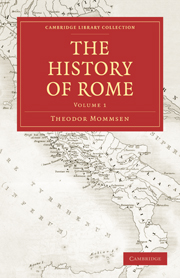Book contents
- Frontmatter
- PREFACE
- PREFATORY NOTE BY THE TRANSLATOR
- EXTRACT FROM DR. MOMMSEN'S PREFACE
- Contents
- BOOK FIRST THE PERIOD ANTERIOR TO THE ABOLITION OF THE MONARCHY
- BOOK SECOND FROM THE ABOLITION OF THE MONARCHY IN ROME TO THE UNION OF ITALY
- CHAPTER I CHANGE OF THE CONSTITUTION.—LIMITATION OF THE POWER OF THE MAGISTRATE
- CHAPTER II THE TRIBUNATE OF THE PLEBS AND THE DECEMVIRATE
- CHAPTER III THE EQUALIZATION OF THE ORDERS AND THE NEW ARISTOCRACY
- CHAPTER IV FALL OF THE ETRUSCAN POWER. THE CELTS
- CHAPTER V SUBJUGATION OF THE LATINS AND CAMPANIANS BY ROME
- CHAPTER VI STRUGGLE OF THE ITALIANS AGAINST ROME
- CHAPTER VII THE STRUGGLE BETWEEN PYRRHUS AND ROME
- CHAPTER VIII LAW. RELIGION. MILITARY SYSTEM. ECONOMIC CONDITION. NATIONALITY
- CHAPTER IX ART AND SCIENCE
- APPENDIX: ON THE PATRICIAN CLAUDII
- ADDITIONS AND CORRECTIONS
CHAPTER VII - THE STRUGGLE BETWEEN PYRRHUS AND ROME
Published online by Cambridge University Press: 05 October 2010
- Frontmatter
- PREFACE
- PREFATORY NOTE BY THE TRANSLATOR
- EXTRACT FROM DR. MOMMSEN'S PREFACE
- Contents
- BOOK FIRST THE PERIOD ANTERIOR TO THE ABOLITION OF THE MONARCHY
- BOOK SECOND FROM THE ABOLITION OF THE MONARCHY IN ROME TO THE UNION OF ITALY
- CHAPTER I CHANGE OF THE CONSTITUTION.—LIMITATION OF THE POWER OF THE MAGISTRATE
- CHAPTER II THE TRIBUNATE OF THE PLEBS AND THE DECEMVIRATE
- CHAPTER III THE EQUALIZATION OF THE ORDERS AND THE NEW ARISTOCRACY
- CHAPTER IV FALL OF THE ETRUSCAN POWER. THE CELTS
- CHAPTER V SUBJUGATION OF THE LATINS AND CAMPANIANS BY ROME
- CHAPTER VI STRUGGLE OF THE ITALIANS AGAINST ROME
- CHAPTER VII THE STRUGGLE BETWEEN PYRRHUS AND ROME
- CHAPTER VIII LAW. RELIGION. MILITARY SYSTEM. ECONOMIC CONDITION. NATIONALITY
- CHAPTER IX ART AND SCIENCE
- APPENDIX: ON THE PATRICIAN CLAUDII
- ADDITIONS AND CORRECTIONS
Summary
Relations between the East and West.
After Rome had acquired the undisputed mastery of the the world, the Greeks were wont to annoy their Roman masters by the assertion, that Rome was indebted for her greatness to the fever, of which Alexander of Macedon died at Babylon on the 11th of June, 431. As it was not very agreeable for them to reflect on the actual past, they were fond of allowing their thoughts to dwell on what might have happened, had the great king turned his arms (as was said to be his intention at the time of his death) towards the west, and contested the Carthaginian supremacy by sea with his fleet, and the Roman supremacy by land with his phalanxes. It is not impossible that Alexander may have cherished such thoughts; nor is it necessary to resort for an explanation of their origin to the mere difficulty which an autocrat provided with soldiers and ships experiences in setting limits to his warlike career. It was an enterprise worthy of a great Greek king to protect the Siceliots against Carthage and the Tarentines against Rome, and to put an end to piracy on either sea; and the Italian embassies from the Bruttians, Lucanians, and Etruscans, that along with numerous others made their appearance at Babylon, afforded him sufficient opportunities of becoming acquainted with the circumstances of the peninsula, and of contracting relations with it.
- Type
- Chapter
- Information
- The History of Rome , pp. 394 - 444Publisher: Cambridge University PressPrint publication year: 2010First published in: 1862

